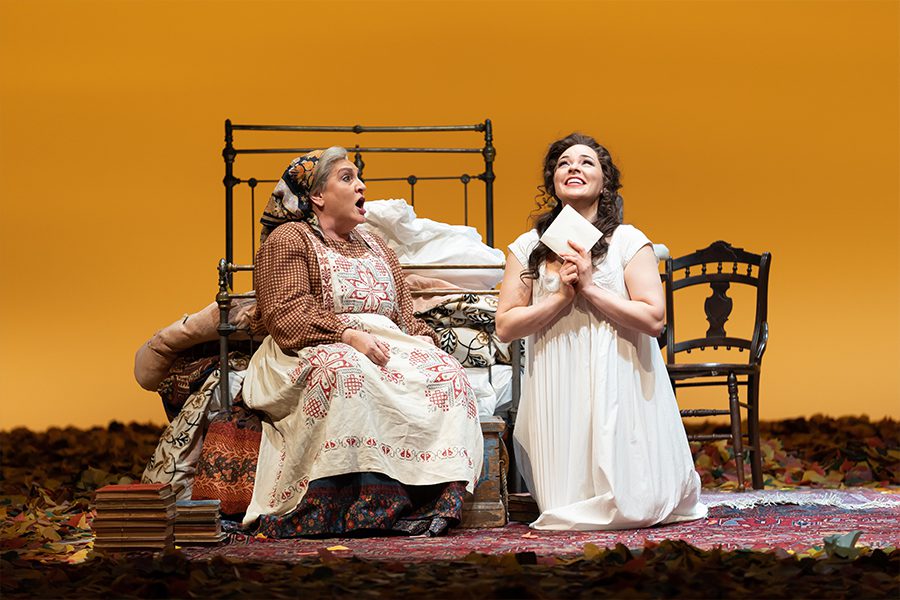A Resonant ‘Onegin’ from WNO
By • March 11, 2019 One Comment 1020

Watching, listening to and experiencing Washington National Opera’s sumptuous, moving production of “Eugene Onegin,” you get the feeling of being on a journey, one that picks up both speed and definition as it moves along at its own pace, sometimes halting, sometimes at the speed of a waltz or a fast dance, sometimes with devastating confessional and confrontational pit stops.
It’s taken 30 years to return this opera to WNO, but for those who longed for its arrival, it was probably worth the wait. For anyone who’s seen it before, the experience might even be transformational, given that they were different people then, and the opera’s spirit might have been different too.
But then again, maybe not. Some things never change — love, hate, death, the accidents of life, bad decisions that reverberate and the way some people can break your heart and leave a scar, not to mention Pyotr Ilych Tchaikovsky’s music and the ghost of poet and novelist Alexander Pushkin. Not to mention the powerful, resonant effect of falling leaves.
This production, running through March 29, is directed by Peter McClintock, who knows his way around Pushkin, having directed WNO’s production of “The Queen of Spades.” He is aided and abetted by conductor Robert Trevino and especially lighting designer Christine Binder, who highlights the punch delivered by Michael Levine’s costumes and vast sets.
All of them help accentuate what is basically a hyper-intense story of unrequited love twice over, essentially a tale about something that doesn’t happen, even if longed for by one of the two principals, at one time or another. The audience, too, is swept from desire to fear.
That, in a nutshell, is the story of Eugene Onegin, an arrogant, recklessly careless egoist who is initially catnip for the impossibly inexperienced and young Tatiana, when they meet in the countryside for her impetuous sister Olga’s birthday. Lensky, who is in love with Olga, has brought Onegin to the celebration.
Tatiana, smitten beyond reason after an initial encounter, writes a long, longing letter to Onegin, who, in a reasonable but devastatingly cold manner, rejects her affection and offer of love. To make matters worse, Onegin flirts with Olga as a way of avoiding Tatiana, which enrages Lensky enough to challenge Onegin to a duel, in which (spoiler) Lensky is killed.
Stricken, in a kind of intellectual and emotional lassitude, Onegin wanders the world aimlessly. Then, at a high-society gathering, he encounters Tatiana, now fashionable, self-assured and still as beautiful as before, married to a much older general and a national hero.
Now it’s Onegin’s turn to be smitten, badly, madly. He implores her to give up her new life to be with him, with importuning that borders on pathological aggression.
Will she or won’t she? And what does it mean today?
Lots, more than likely, given the earthly upheavals in how women relate to men and vice versa.
Given all that, it is still (as opera lovers say) all about the music, and here Tchaikovsky, whose popular and best-known music swims in our dreams from “Swan Lake,” “The Nutcracker” and his symphonic works, pulls back a little. The music is almost like a co-conspirator in the wounding. almost anti-romantic plot, with a stream of melody here, a waltz or two there. It assists at all times, letting the principals shine, offering changes in tempo for a daughter or a general, helping Olga to soar and underlining Lensky’s despair.
Russian soprano Anna Nechaeva as Tatiana and Russian baritone Igor Golovatenko (from the Bolshoi Opera) as Onegin are standouts, making their American debuts. In long sequences, she adds a shower of charm to her innocence and a sturdier strength to her hard-gained maturity. Golovatenko, from the moment he walks onto the stage wielding his walking stick like a badge of superiority, is the essence of what can best be described as a formidable cad.
Mezzo-soprano Lindsay Ammann brings high energy to Olga and Alexey Dolgov sings powerfully and with great, clear emotion as the luckless Lensky. But bass Eric Halfvarson milks some surprising emotion out of the role of Tatiana’s husband, singing that “love is not only for the young.”
I suppose you could make a case for modernizing the opera, but it seems squarely and in a golden way existing in the past, and by that we mean the Russian past of the imagination and of literature and royalty, when class mattered and ruled. The production echoes not contemporary Russia or the old Soviet Union, but the literary and musical tropes of the last days of Tsarist Russia.
While there are moments of gaiety and energy, there’s a strong dose of melancholy and attractive reverie and remembrance. It’s not soap opera but the dramatics of opera that surge in this production. Often the stage seems powerfully grand, dwarfing the characters, but at times, when it moves between intimacy and epic flavors, you expect the characters of Tolstoy and Chekhov to come wandering onto the stage out from the wings among the falling leaves.


Wow! This can be one particular of the most beneficial blogs We have ever arrive across on this subject. Actually Great. I’m also an expert in this topic so I can understand your hard work.